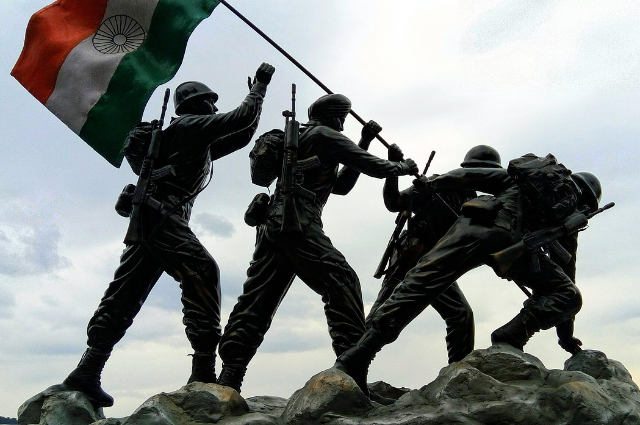
Image by Jai Bhutani from Pixabay
I lay awake, struggling with the night as tensions increased from Srinagar to Chandigarh to Bhuj and Rajsthan, with reports interspersed with the menacing shriek of sirens and the blackouts' darkness. At 9:45 PM, a friend called to break the silence. Her worried voice asked if I was home, mentioning the evacuation at India Gate and the escalating tensions between India and Pakistan. Our morning routine changed amid the pandemonium; instead of enjoying a peaceful tea ritual while gazing out at the trees, we huddled on the sofa and watched the unfolding drama of newsreaders on TV. As we considered the ramifications of war, the seriousness of the situation gradually became apparent to us, like a nagging fog.
I found it difficult to find the correct words to soothe my friend as I cut the call while the question lingered in the air like a challenge: Is this a warlike situation going to last long? My mind whirled like a tempest as I struggled to explain to myself the intricacies of war and geopolitics: why do wars occur? As I was lost in my thoughts, the housekeeper interrupted with folk wisdom, her remarks a blend of rural simplicity and compassion. "I'll go to my village if there is a conflict. There, we'll be secure. Our town won't be discovered by missiles. Her gullibility made me laugh, but I couldn't help but worry that our life would once more be reduced to a virtual one, with my job on the line and the kids' education taking place online. The ambiguity hovered above us like a three-edged knife seeking to break its truce.
An Outsider's Perspective on the Army
I felt almost embarrassed to voice my concerns as a civilian who is protected and whose life is generally in order, especially after knowing about the bravery and hardships an officer must endure. I had a shocking realisation after reading the moving story of an army commander. The officer offered a moving observation: "Like any relationship, we married our army men because we loved them. Their priorities, however, are very dissimilar. Their devotion to the nation comes first, then their soldiers, and then us, their spouses and families. Early on in our marriage, we came to understand that love for the nation is a mutual aspiration.
The Indian Army is a family bonded by sacrifice, devotion, and loyalty rather than a business. We move together as a team, helping one another through good times and bad. We are treated with extra respect and status in these homes because we are ladies. Taking care of the house and our kids while our husbands are away on duty has taught us to be self-sufficient. We take on the role of pillars of strength, maintaining the fires in our homes. But maintaining the spirit of heroism for our kids is more important than simply running the home. Their fathers serve as role models for them, therefore, we must be careful not to let our worries and anxieties affect them.
Even when anxiety eats away at our hearts, we put on brave fronts. But as civilians, our intestines turn to knots when the phone calls come at strange hours. Irrespective of the glaring uncertainty, I hail with pride the ones serving our country in these difficult times. Knowing that they are fighting for a higher cause helps us face this difficult and heartbreaking truth head-on.
The life of the army is a holy vow to the security of our nation. Here is another narrative that changed my mindset forever- The collective emotion of military families, the army officer observed, is one of solidarity, carefully controlled anxiety, and a brave, unwavering smile as the "sanginis" pack their spouses' uniforms or stash extra paracetamol or their favorite candy in a corner of their carry-all. She had firsthand experience with the defence forces from both perspectives. We take turns sitting with one another in neighbouring homes and make sure to check on one another multiple times a day as a community of military wives. Nobody can match this courageous enthusiasm; everyone thinks of "us."
This harsh truth helps me to put my concerns in perspective. They confront the terrifying possibility of danger and separation, while I worry about trivial matters. Their loved ones are frequently forced to deal with uncertainty on their own. Their resilience and tenacity are ones we can never match and should be marvelled at. We have one duty to them as civilians: genuine respect.
Bowing in solidarity, with tears in my eyes, I stand,
A heart filled with respect and eyes filled with hope, I salute the brave,
The ones who tie the thread of death like a symbol of love for their land.
I sit here typing with shaky breaths as millions of spirits wait for their dawn that lies forlorn
To all the brave army men and women of my holy nation,
I praise thee with all my might, waiting for you to emerge victorious,
And with pride and safety, come back home.
